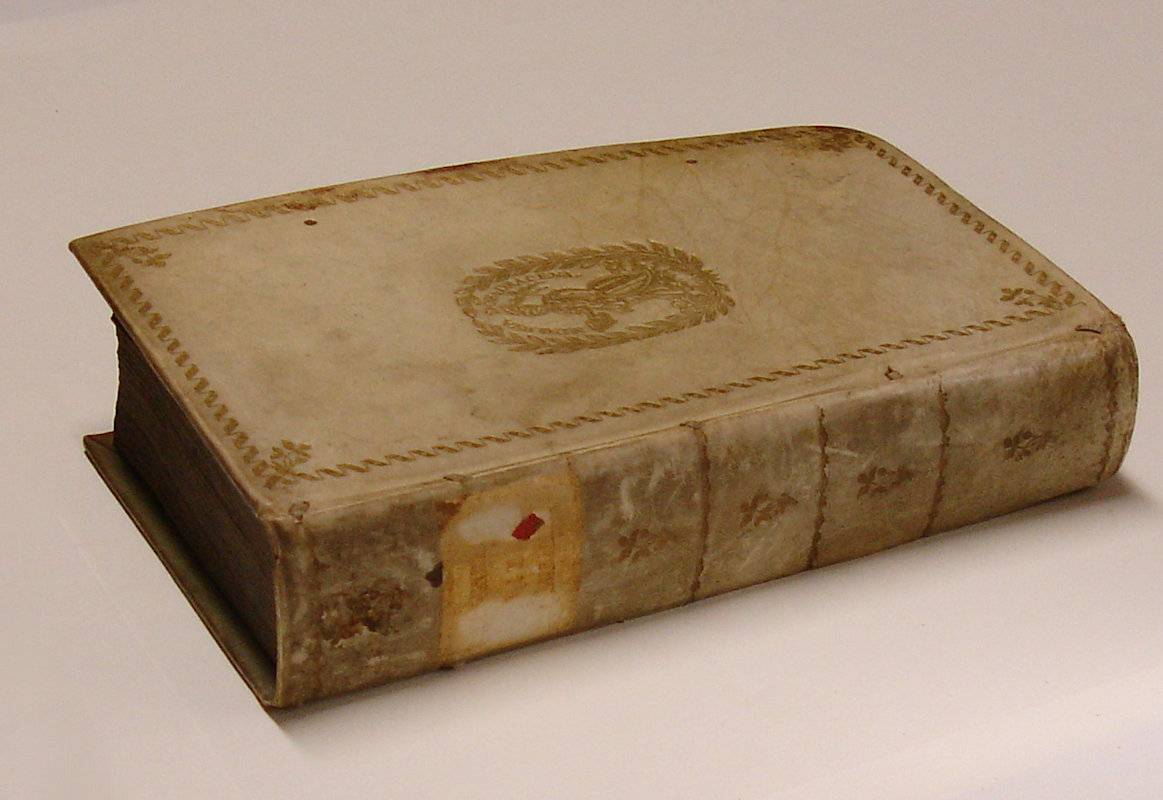HEMSTERHUIS,T.- BERGMAN,J.Th.
Elogium Tiberii Hemsterhusii, auctore Davide Ruhnkenio. Accedunt duae Richardi Bentleji epistolae ad Hemsterhusium. Vita Davidis Ruhnkenii, auctore Daniele Wyttenbachio. Cum praefatione et annotatione edidit Joannes Theodorus Bergman.
Leiden (Lugduni Batavorum), Apud S. & J. Luchtmans, Amsterdam (Amstelodami), Apud P. den Hengst et Filium, 1824.
8vo. (VIII),XLIV,(IV);532 p. Vellum 22 cm (
Ref: Ebert 24055: 'Beste Ausgabe dieser beiden Meisterwerke'; Graesse 6/1,191 & 6/2,481; Spoelder p. 545, Dordrecht 2) (
Details: Prize copy, but without the prize. Back and boards gilt, gilt coat of arms of Dordrecht in the centre of both boards. The last 230 pages contain the notes of Bergman) (
Condition: Prize gone. Vellum age-toned, back soiled, red label in the 'second compartment' gone. Upper board slightly curved. Several marginal pencil annotations and some foxing) (
Note: The honour of reviving the study of Greek in the Netherlands belongs to the Dutch classical scholar Tiberius Hemsterhuis, 1685-1766, who became professor Mathematics and Philosophy at the Athenaeum of Amsterdam at the age of 19. His great example was the English classical scholar Richard Bentley, 1662-1742, Master of Trinity College, Cambridge, with whom he corresponded early in his career. In 1705 Hemsterhuis was promoted to a professorship in Harderwijk, and in 1717 he was appointed professor of Greek at the University of Franeker. In 1740 he was finally called to Leiden. He produced an edition of Pollux (1706), 'Luciani colloquia et Timon' (1708), the complete works of Lucianus (1743) and of the Plutus of Aristophanes (1744), a work which Gudeman calls 'epochemachend'. He contributed also notes to the editions of many other scholars. Sandys observes that 'the work of a Hemsterhuis was worth whole bundles of the mechanically manufactured products of a Burman'. (Sandys 2,451) Hemsterhuis was the founder of a Dutch school of criticism, the so-called 'Schola Hemsterhusiana', which had disciples in Valckenaer, Jacob van Lennep and David Ruhnken. The last one was the most famous of his pupils. 'Hemsterhuis has had the supreme felicity of being immortalised by a 'laudator eloquentissimus'. The 'Elogium' delivered in 1768 by his devoted pupil Ruhnken (...) is one of the Classics in the History of Scholarship. It presents us with the living picture of the perfect critic'. (Idem, ibidem)
§ The Dutch scholar of German origin David Ruhnken, or Ruhnkenius, 1723-1798, was born in Pommern, and was sent by his parents in 1737 to the Friedrichscollegium in Königsberg, where he read Latin authors together with his friend Immanuel Kant. To finish his studies he went in 1744 to Leiden, to study Greek under Tiberius Hemsterhuis, whom he admired. He later told his biographer Wyttenbach that he found in his teacher the combined gems of Leiden classical scholarship, Scaliger and Salmasius, in one person. Hemsterhuis wanted to create a worthy successor and appointed him in 1757 to assist him as Reader in Greek. In 1761 Ruhnken succeeded the Latin chair vacated by Oudendorp. He became one of the leading scholars of his days. 'Die Führerstellung der Philologie erbte (...) von Hemsterhuys der Pommer David Ruhnken, der ganz zum Holländer ward und die vornehme und behäbige Würde eines Princeps criticorum zu wahren wusste. Als solchem hat ihm Fr.A. Wolf die Prolegomena gewidmet. (...) Musterhaftes Latein galt ihm soviel wie Wissenschaft. Aber als Lehrer muss er glänzend gewesen sein. (...) Alles was Ruhnken veröffentlicht hat, ist in seinen Grenzen tadellos'. (U. von Wilamowitz-Moellendorff, Geschichte der Philologie, Lpz./Bln. 1921, p. 39/40)
§ Ruhnken was immortalized by Daniel Wyttenbach, 1746-1820, born at Bern in Switzerland, who came to Holland in 1770 to stay there, like Ruhnken before him. 'In the next 28 years he held professorships at Amsterdam (1771-99), and then returned to Leyden as Ruhnken's successor for 17 years (1799-1816)'. (Sandys 2,463). He published an edition of the complete Moralia of Plutarchus (with Latin translation) (1795-1806), a work of permanent value. On the death of Runken he became the most influential classical scholar in the Netherlands. 'The highest praise must be assigned to his Life of Ruhnken, a work of absorbing interest to his scholarly contemporaries, which still retains its importance as a comprehensive picture of the Scholarship of the Netherlands, and not of the Netherlands alone, in the age of Ruhnken'. (Idem 2/465)) (
Provenance: in ink on front flyleaf: 'W.J.W. Kosteri ex libris'. The specialties of the Dutch scholar Willem Johan Wolff Koster, 1896-1986, were metrics and Aristophanes. In his dissertation 'De Re Metrica tractatus Graeci inediti' , Leiden 1922, he argued that the current views concerning Greek metrics were founded on an unstable basis, and that it would be wise to return to the sources, the ancient tractates on metrics. Very influential was his 'Traité de métrique grecque' of 1936, 4th. edition 1966. In 1940 he was appointed professor of Greek at the University of Groningen. Linked to his interest was his work on the metrics and the scholia of Aristophanes. In 1927 he already published 'Scholia in Aristophanis Plutum et Nubes', which was only the start of his 'opus magnum', the edition of the 'Scholia in Aristophanem', a scholarly entreprise of nearly half a century, that started in 1960 under his supervision, and then of D. Holwerda, who has seen it through to completion with the appearance of the scholia to the Thesmophoriazusae and Ecclesiazusae in 2007. This enormous project offers the first new critical edition of the complete scholia to Aristophanes since Dübner's in 1842. (J.C. Kamerbeek, 'Levensbericht W.J.W. Koster', in: Jaarboek, 1988, Amsterdam, p. 140/45. See also the review of R. Tordoff: 'R.F. Regtuit (ed.), Scholia in Thesmophoriazusas; Ranas; Ecclesiazusas et Plutum. Scholia in Aristophanem, III 2/3', Bryn Mawr Classical Review 2008.09.24)) (
Collation: pi4, *-3*8; A-2K8, 2L2) (Photographs on request)
Book number: 130070 Euro 250.00
Keywords: (Oude Druk), (Rare Books), 18th century, Biographie, Geschichte der klassischen Philologie, Hemsterhuis, Niederlanden, Prize copy, Prize copy Dordrecht, Ruhnken, The Netherlands, Wyttenbach, antike altertum antiquity, biography, catbiografie, history of classical scholarship
 HEMSTERHUIS,T. BERGMAN,J.Th.
HEMSTERHUIS,T. BERGMAN,J.Th.